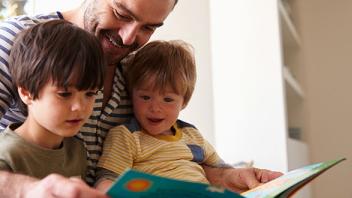Is your child already enthusiastic about rhyming games, Scrabble, anagrams, or Pig Latin? Try adding a new kind of word game to your collection: riddles!
What is gray, has four legs, big ears, a tail, and a trunk?
A mouse going on vacation!
Riddles are an excellent way for kids to learn how to really listen to the sounds of words, understand that some words have more than one meaning, and how to manipulate words. Riddles also help build a rich vocabulary and strengthen reading comprehension. And finally, riddles are familiar and fun — a good incentive for thinking about words and reading. Here’s how to get started with riddles:
Riddle books
There are lots of wonderful riddle books (see Reading Rockets’ booklist, Lots of Laughs). Dive into one and just start reading some of the riddles out loud — the questions and the answers. Talk about the structure of the riddle (question/answer) and why the answers make silly sense if you understand the multiple meanings of the words. Share your thinking about the word play to help your child understand the riddle more clearly. Riddle books are especially entertaining for family trips or long drives, and can inspire original riddle-making by parents and kids alike.
Homonym fun
Homonyms — words that sound the same but have different meanings — provide a great opportunity for word fun. Say a word out loud, and see if your child can generate more than one meaning for the word. For example:
ball: a round object used in games
ball: a fancy partymoose: the animal with antlers
mousse: a chocolate dessert
Word meaning and context
Show your child how to figure out what a word means by thinking about the words around it. For example, the word “school” can refer to your child’s classroom or a group of fish. Once your child becomes aware of the double meaning of “school” he can start to appreciate or even invent riddles like this:
Why are fish so smart?
Because they swim in schools!
Download this article in Spanish
Subscribe to Growing Readers!
Get our free monthly parent tips — in English and Spanish — delivered right to your inbox!
